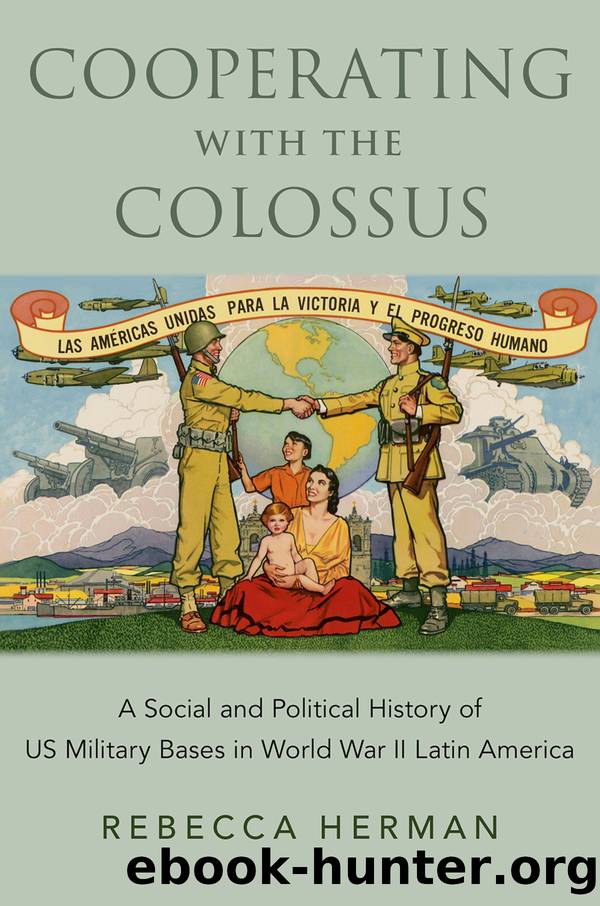Cooperating with the Colossus by Rebecca Herman

Author:Rebecca Herman
Language: eng
Format: epub
Publisher: Oxford University Press
Published: 2022-06-15T00:00:00+00:00
CHAPTER 6
Criminal Jurisdiction
No issue proved a greater sticking point as US officials negotiated the terms of wartime basing with their allies in Latin America than the matter of criminal jurisdiction over US military personnel stationed in the region. US military leaders insisted that jurisdiction over their troops overseas was necessary to ensure discipline and order within the armed forces, but many in Latin America regarded the right to enforce national law within national borders as a defining feature of sovereignty. Manifest in this one issue were so many of the tensions between cooperation and sovereignty that overseas basing surfaced. The jurisdiction question seemed an explicit test of the United Statesâ recent commitment to respect the territorial sovereignty of the other American Republics and of Latin American nationalistsâ commitment to defend that sovereignty in the face of US power. Those who opposed extraterritorial authority viewed the US governmentâs desire for it as evidence of continued condescension in US policy toward the region; if all Americans were equally fit to govern, then Latin American laws, courts, judges, and police officers should be trusted to do the job. Moreover, it was not just a matter of international law or politics; like so many of the governance issues that arose on the ground, it was socially significant. To community leaders lamenting the descent of their cities and villages into moral disrepair, the right to police the behavior of US troops in their midst and to enforce not just the laws, but the social norms encapsulated in the lawâs prohibitions, all seemed a moral imperative to which they, as allies, were entitled.
After World War II, Status of Forces Agreements (SOFAs) dictating the terms of governance over criminal actions by US troops would become a standard feature of US basing overseas.1 But during World War II, no such template yet existed. US officials managed to successfully negotiate jurisdiction over US troops in many parts of the world during World War II, including in âpeerâ nations of Western Europe, but in Latin America, with the specter of past politics and the fervor of nationalism hovering over the wartime alliance, foreign ministers across the region consistently declined to formally surrender jurisdiction over US servicemen as a matter of principle. Even if they had been able to manage it, the arrival of US soldiers at the new defense sites predated the conclusion of the military agreements that sanctioned their stay. In places where precedent offered loose guidelines for managing jurisdiction, as was the case in Panama, the protocol for implementing agreed-upon principles proved a source of great conflict as well. Where diplomats could not reach an agreement at all, US officials simply moved forward without one, content to rely on claims that their right to jurisdiction was vested in âaccepted principles of international law,â while sparing their Latin American allies the political costs of conceding the point. In this context, protocol for managing criminal actions by US personnel in Latin America, like the diverse systems for regulating prostitution or
Download
This site does not store any files on its server. We only index and link to content provided by other sites. Please contact the content providers to delete copyright contents if any and email us, we'll remove relevant links or contents immediately.
american english file 1 student book 3rd edition by Unknown(616)
Phoenicians among Others: Why Migrants Mattered in the Ancient Mediterranean by Denise Demetriou(612)
Verus Israel: Study of the Relations Between Christians and Jews in the Roman Empire, AD 135-425 by Marcel Simon(595)
Caesar Rules: The Emperor in the Changing Roman World (c. 50 BC â AD 565) by Olivier Hekster(582)
Basic japanese A grammar and workbook by Unknown(580)
Europe, Strategy and Armed Forces by Sven Biscop Jo Coelmont(523)
Give Me Liberty, Seventh Edition by Foner Eric & DuVal Kathleen & McGirr Lisa(500)
Banned in the U.S.A. : A Reference Guide to Book Censorship in Schools and Public Libraries by Herbert N. Foerstel(492)
The Roman World 44 BC-AD 180 by Martin Goodman(479)
Reading Colonial Japan by Mason Michele;Lee Helen;(471)
DS001-THE MAN OF BRONZE by J.R.A(467)
Introducing Christian Ethics by Samuel Wells and Ben Quash with Rebekah Eklund(464)
The Dangerous Life and Ideas of Diogenes the Cynic by Jean-Manuel Roubineau(458)
Imperial Rome AD 193 - 284 by Ando Clifford(457)
The Oxford History of World War II by Richard Overy(456)
Catiline by Henrik Ibsen--Delphi Classics (Illustrated) by Henrik Ibsen(441)
Language Hacking Mandarin by Benny Lewis & Dr. Licheng Gu(413)
Literary Mathematics by Michael Gavin;(409)
Brand by Henrik Ibsen--Delphi Classics (Illustrated) by Henrik Ibsen(399)
